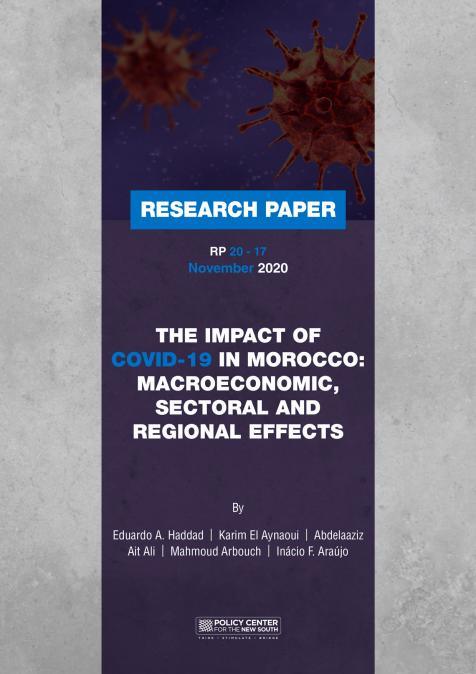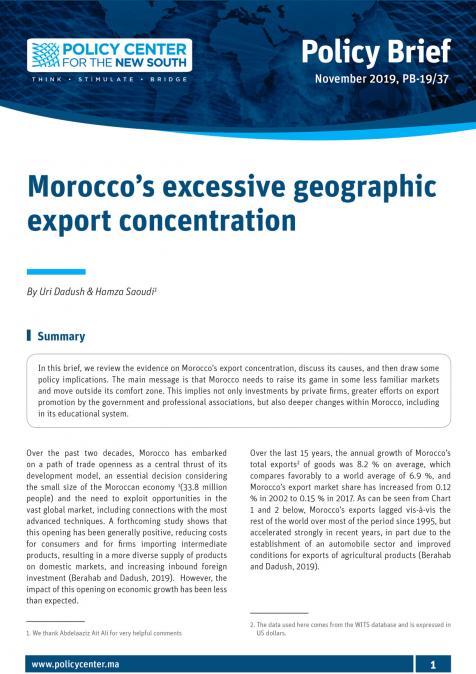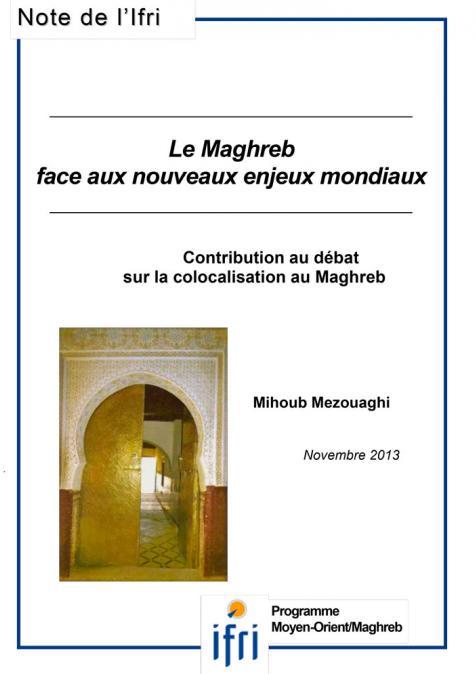Publications /
Opinion
In an attempt to bring the World Cup back to Europe and Africa, Morocco has joined Spain and Portugal in a three-way bid to host the 2030 FIFA World Cup. While there are still talks of Ukraine remaining in the bid, the three confirmed countries are hoping to score big with major economic, cultural, and political benefits. Although not as large as the Olympics in terms of logistics, the FIFA World Cup is one of the most prestigious and watched sporting events in the world. Early figures from FIFA suggest that around 5 billion people engaged with the World Cup in Qatar 2022, making it the largest ever sporting mega-event in terms of audience.
Organizing the most coveted sporting mega-event in the world is not without its challenges. The sheer scale of the tournament requires significant investment in infrastructure, security, political support, financial resources, and regional cooperation, among others. Morocco, Spain, and Portugal will have to go beyond individual prowess and join forces to make their bid a success. Spain and Portugal are both well-versed in hosting high-profile football events, having hosted the UEFA Euro 2004 and 1982 FIFA World Cup respectively. Thanks to the successful organization of three FIFA Club World Cups and a historic run to the semi-finals of the 2022 World Cup, Morocco has also established itself as a rising football nation worthy of co-hosting the tournament. Morocco’s bid with its partners has enormous potential, offering a unique opportunity to showcase the best of what these three nations have to offer, both on and off the pitch.
Connecting the North to the South
Thanks to the new enlarged format of the FIFA World Cup, which will come into effect from 2026, FIFA is encouraging countries to organize tournaments jointly, which will surely have positive spin-offs in terms of regional cooperation. The 2026 FIFA World Cup, to be hosted by Canada, Mexico, and the United States, will be the first tripartite organization and the first demonstration of North-South cooperation in World Cup history. Branded as the ‘North American bid,’ this bid went beyond the geographical dimension, as the three countries capitalized on a pre-existing tripartite economic relationship in NAFTA (now replaced by the USMCA), which provided a solid foundation for the bid.
The Morocco-Spain-Portugal bid also seems to have a regional dimension. As HM King Mohammed VI emphasized in his message on the occasion of the presentation of the CAF Excellence Award 2022: "this joint bid, unprecedented in the history of football, will bring together Africa and Europe, the north and south of the Mediterranean, the African, Arab, and Euro-Mediterranean worlds.” It would therefore not be surprising if this bid were unofficially called the ‘Mediterranean bid’.
Unlike the successful 'North American bid,' the ‘Mediterranean bid’ is not based on pre-existing cooperation. The Euro-Mediterranean cooperation scheme as defined by the Barcelona Process has proved less successful than the bilateral relationships established between some northern and southern Mediterranean countries. In fact, the three countries rely mainly on their mutual trade relations. Spain is Morocco's main trading partner reaching a new historical high with Spanish exports to Morocco increasing by 23.6% and Moroccan exports to Spain increasing by 19.9%. Despite facing almost two years of diplomatic crisis, the two countries -thanks to recent rapprochements (e.g., The Morocco-Spain Economic Forum)-, are slowly trying to salve their wounds. This raises the question of the role of football and joint organization of mega-sports events in restoring strained relations between countries. It is a chicken-and-egg argument about which comes first: is strong cooperation necessary for the optimal organization of the World Cup, or will the bid be the great equalizer that could lay the foundations for steadier cooperation?
In fact, participating in or co-hosting football events presents both opportunities and risks in terms of advancing or hindering relationships between countries with histories of hostility. In 2002, for example, Japan and Korea hosted a successful World Cup despite their historical rivalry. During the bidding process, tensions were so high that Japanese representatives contested the official title of the event ‘2002 FIFA World Cup Korea/Japan,’ which was determined according to the French alphabetical order (Corée and Japon). Despite a difficult start, the two countries, driven by age-old animosity, managed to organize a successful World Cup together. This is not to say that the tournament was the main catalyst for a better relationship between the two countries, as historical issues continue to be a source of tension to this day. However, the 2002 FIFA World Cup experience paved the way for better dialogue and promoted the idea that, when necessary, two countries can put aside their differences to achieve a common goal of mutual benefit, but it remains to be seen how the three countries will manage the significant needs that come with hosting this major tournament.
The Economics of the World Cup: Wins-Losses-Draws
While hosting the World Cup can generate significant economic benefits, including in terms of tourism and foreign trade, the benefits must be weighed against the costs. Hosting the World Cup can be a costly undertaking for countries as they have to invest significant resources in building new infrastructure, such as stadiums and transportation systems. Some have even described hosting the World Cup as an economic gamble, as it can sometimes lead to massive debt. Like any football match, there are winners and losers in organizing the World Cup.
Why, then, are nations so keen to bid for the World Cup? Most countries vying to host the World Cup are not interested in short-term gains, but rather in creating a positive image of their country by taking advantage of the global attention the tournament receives. These are the intangible benefits of hosting the World Cup, projecting soft power, and giving the world a window into the host country, while showing how the new infrastructure makes it an ideal place to visit and invest in. A 2014 study estimated that even reaching the quarter-final stage of the World Cup could raise a country’s exports temporarily by 4% to 7%. This supports the idea that any positive commercial effect associated with sporting or organizational success can only result from increased visibility.
Despite much criticism and prejudice, Qatar was able to host one of the most successful World Cups ever. The Gulf country gained international recognition, and established itself as a country that is seeking to diversify its economy (tourism, sport, culture, etc.). In contrast, one of the arguments against hosting the World Cup is the idea that it diverts funds from crucial areas including education, health, and infrastructure, to other purposes: building stadiums. After the 2014 World Cup, Brazil was left with a herd of ‘white elephant’ stadiums, that remain today deserted or underused. However, there are several ways to mitigate the loss. Take the example of Stadium 974, which was the first fully dismantlable FIFA World Cup venue. Made from 974 reusable shipping containers, the idea behind the stadium is a real lesson in cost effectiveness and sustainability. It shows that with effective planning, the World Cup host country can avoid losses and at least secure a draw.
Morocco-Spain-Portugal Bid: What Predictions?
Obtaining the right to host the FIFA World Cup is subject to a strict evaluation by FIFA. According to FIFA's guide to the bidding process, the infrastructure criteria amount to 70% of the overall score (of which 35% for stadiums, 13% for transport and mobility, and 6% for accommodation, among other criteria).
On paper, the ‘Mediterranean bid’ looks promising. One of the key selling points of this bid is the fact that the three countries are geographically close, well connected by rail, ferry, and air, and considered safe and politically stable. Thanks to their touristic attributes, all three countries are well endowed with touristic infrastructures. The decision to submit a joint bid will increase substantially the chances of success and will spread the financial burden over the three countries.
One of the advantages of co-hosting the World Cup is that there is no need to build new venues to host the matches. Spain and Portugal have already unveiled a list of 15 stadiums in Spain and three stadiums in Portugal. Now that Morocco has joined the bid, there has still been no communication on how many Moroccan stadiums will be eligible to host matches. Morocco is not expected to get the lion's share of the tournament, as Spain will host the largest number of matches.
On the other side of the pitch is a four-nation South American bid (Uruguay, Argentina, Chile, Paraguay), which relies heavily on symbolic legitimacy. The year 2030 will mark the centenary of the World Cup, and it will be an attempt to bring it back to Uruguay, where it all began. There are other bids in the pipeline, including a possible Egypt-Greece-Saudi Arabia bid, and all countries will be doing their best to gather votes.
For the Morocco-Spain-Portugal bid, all three countries have the capacity to attract votes. Spain and Portugal will unquestionably have the support of the European Union. On April 5, CAF's Executive Board unanimously approved Morocco's bid to co-host the 2030 FIFA World Cup, which could be beneficial in garnering African votes. In its last bid to host the 2026 World Cup, Morocco received 79% of the African votes, and is expected to receive more for the 2030 bid. With the Royal Moroccan Football Federation (FRMF) having established relationships with more than 40 sub-Saharan African federations in various fields (development, sports, etc.), this will be the perfect time for the FRMF to reap the benefits of its years of partnership with its African counterparts.
The Morocco-Spain-Portugal bid could be an opportunity to mend fences and bridge the gap between the North and the South by creating a collaborative legacy that could extend far beyond the competition. It remains to be seen whether the Morocco-Spain-Portugal bid will score the decisive goal in the bidding competition, but one thing is certain, it is gradually emerging as the favorite.










